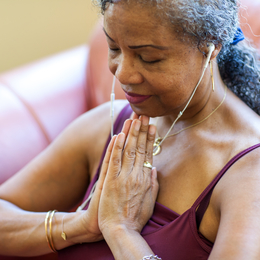
The COVID-19 pandemic has turned Americans’ lives upside down. Families have been holed up at home for weeks, with little to no contact with the outside world. The news headlines cite grim statistics. Supermarket shelves have gone barren. Even the simple act of stepping outside can feel like a risk to one’s life and limb.
Such an unprecedented situation can take an immense toll on one’s mental, emotional, and physical wellbeing. But there are ways to cope with the uncertainty, according to Michael Young, M.D., service chief of The Retreat at Sheppard Pratt, a Baltimore-based residential treatment program for individuals dealing with many of the mental health problems that have the potential to derail a life.
“When you hear or read or watch the news of an outbreak of an infectious disease or some other stressful world event, many people show anxiety or signs of stress,” he says. “That’s perfectly normal, and it may be more pronounced for people who live in or have loved ones who live in parts of the world that are most affected.”
Dr. Young suggests it’s up to each person to monitor his or her own health, to recognize signs of stress, and to know how to relieve that stress. In addition, he says people must be able to know when it’s time to reach out for help when the stress and anxiety feel as though they are too much to bear.
Stress can cause a number of physical, emotional, behavioral, and cognitive responses. Common physical responses include stomachache, intestinal distress, headache, loss of appetite or overeating, sweating or chills, and the ability to be easily startled. Emotional responses include feeling anxious, depressed, or guilty, or not caring about much of anything at all; others might experience feelings of euphoria or invulnerability as a defense. Behavioral issues might include an increase or decrease in one’s energy level, the inability to relax, and the increased use of alcohol, tobacco, or illicit drugs. Cognitive responses might include trouble concentrating or remembering things, feeling confused, and difficulty making decisions.
To help overcome such issues, Dr. Young prescribes the following self-care methods:
* Maintain positive social connections. “It’s particularly important to connect with loved ones at times like these, not only to talk about our concerns, but also to enjoy conversations unrelated to the stressor, and to remind ourselves of the important things in our lives,” he says. “These connections can help us keep things in perspective.”
* Know when to tune out. While it’s important to stay connected to world events through the news and social media, Dr. Young suggests it’s just as important to take breaks from such stimuli in order to keep from feeling overwhelmed or unsettled. Listening to music, picking up a favorite book, or taking a walk outside each may serve as an effective “reset.”
* Keep moving. Taking care of the body can help to take care of the mind. The temptation of sugary or fatty foods may provide short-term comfort, but they can ultimately have a negative effect on one’s view of the world. Dr. Young recommends continuing to eat healthy and well-balanced meals, drinking lots of water, and getting plenty of sleep and rest. He also suggests mindfulness through meditation and yoga, getting regular exercise, and avoiding excessive alcohol, tobacco, and caffeine, which can increase anxiety and affect sleep.
* Help others in need. Even in an era of social distancing, it’s still possible to connect with others apart from phone, text, or Zoom. Dr. Young suggests looking for opportunities to volunteer by contacting neighborhood associations, local churches, or humanitarian organizations such as the American Red Cross. “Ask if there’s anything you can do on your part,” he says. “Helping others can be a strategy for overcoming fear.”
If the fear and anxiety get beyond one’s control, Dr. Young advises reaching out for support and sharing one’s feelings with loved ones. At the same time, he says it’s essential to know when it’s time to seek help beyond social support systems. In cases of true mental health emergency, an individual can call 211 for counseling and support or (800) 273-8255 for the National Suicide Prevention Lifeline.
For residents of Maryland, Sheppard Pratt’s Crisis Walk-In Clinic is designed to help those in immediate need through psychiatric triage. In addition, the organization has adapted to offer urgent online therapy by way of a Virtual Crisis Walk-In Clinic.
“One of the key aspects of this time is to embrace the idea that we are all in this together,” Dr. Young says. “Every person on the planet is going through this shared experience. Part of self-compassion is recognizing the humanity in our suffering. Embracing self-care, embracing self-compassion, and reaching out to loved ones—these are the key things. Positive social connection with others is critical right now. Now is the time to reach out to others we are close to and stay connected.”
Published (and copyrighted) in Suburban Life magazine, April 2020.


